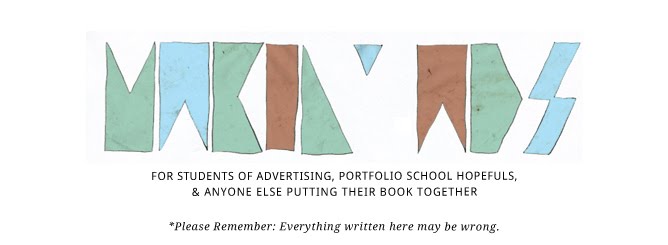Here are four characteristics of the kind of advertising we all aspire to create:

But most of us focus the majority of our efforts on only one area:

We're in the
creative department. We're called
creatives. One of the leading industry magazines is called
Creativity.
The problem is, almost all of the student portfolios I see are creative. But that doesn't get them a job. In most cases it doesn't even get them an interview.
A lot of the advertising I see on TV and billboards and online is creative. But that doesn't mean they're going to win Lions at Cannes. It doesn't even mean the writer and art director who came up with the idea will want to showcase it in their portfolios.
The way creative begins to stand out is to make it brilliant.
There are a lot of ways creative can become brilliant. A great brief with a great insight. Mind-blowing art direction. A real human truth. Basically, I think it's creative work that the team actually cares about. It's creative that tries harder.
Brilliant creative elevates your book out of the crowd a little bit. It puts you in the top quarter of portfolio school graduates. But top quarter isn't really enough, right?
The next leap is to make it different.

It can't just be different for different's sake. You've got to back it up with the brilliance. So what's the difference between brilliant creative and being different? It's got to have that "I've never seen that before" feel. Look at the
Skittles work. Completely different than anything in the candy category. Look at the
Space Chair work from Toshiba. Or the
We Choose the Moon site from Martin. Or
Whopper Freakout. Not just brilliant creative, but very different from anything that came before.
I have seen only a few student books that have been able to do something truly different. And those were students that agencies were quick to hire.
But the big leap is to make your work innovative.
This is real Titanium Lion territory. And to be honest, it's hard for me to imagine pulling something like this off in portfolio school. It's hard enough once you're in a job. But knowing what to reach for is a great place to start training your brain.
The adage is "Good enough isn't good enough."
But whether you're trying to get a job, a raise, a Lion or a reputation, I think the new thought is "Creative isn't good enough."
(Credit for the four-quadrant idea goes to Gideon Amichay, the ECD of Y&R Tel Aviv.)









